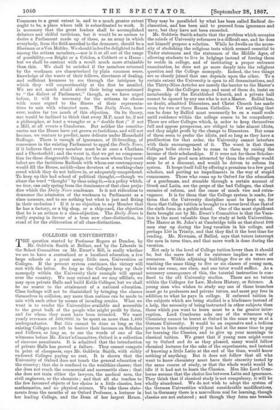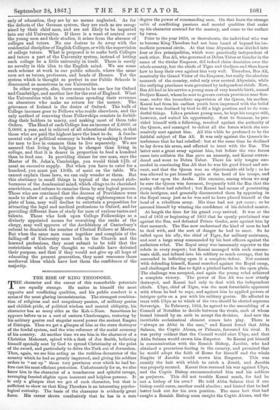COLLEGES OR UNIVERSITIES? T HE question started by Professor Rogers at
Dundee, by Mr. Gold win Smith at Belfast, and by the Liberals in the Select Committee on Mr. Ewart's Bill, is really whether we are to have a centralized or a localized education, a few large schools or a great many little ones, Universities or Colleges. If the present system continues, the victory will rest with the latter. So long as the Colleges keep up their monopoly within the University their example will spread over the country. We may extend and we may affiliate, we may open private Halls and build Beble Colleges, but we shall be no nearer to the attainment of a national education. Class feelings will not be diminished by bringing the classes themselves in collision, any more than nations can be made to mix with each other by means of invading armies. What we want is to render the Universities available and accessible to the great bulk of the people who might profit by them, and for whom they must have been intended. We want yearly revenues of 500,0001. to be spent on more than 1,400 undergraduates. But this cannot be done so long as the existing Colleges are left to bestow their incomes on Scholars and Fellows, so long as, to use the words of one of the witnesses before Mr. Ewart's Committee, Oxford is a collection of sinecure annuitants. It is admitted that the introduction of private Halls has proved a failure. They cannot compete in point of cheapness, says Mr. Goldwin Smith, with richly endowed Colleges paying no rent. It is shown that the University of Oxford does not touch the general education of the country; that she is confined to the wealthier classes; that she does not reach the commercial and mercantile class ; that she does not train either the lawyers, the medical men, the civil engineers, or the chemists ; and that all she teaches to the few favoured objects of her choice is a little classics, less mathematics, and no physical science. We take these state- ments from the mouths of an Oxford Professor, a lecturer in her leading College, and the Dean of her largest House. They may be paralleled by what has been called Radical de- clamation, and has been said to proceed from ignorance and envy, but they have not been exceeded.
Mr. Goldwin Smith admits that the problem which occupies the minds of University reformers is a difficult one, and he does not himself propose a solution. While he dwells on the neces- sity of abolishing the religious tests which seemed essential to Tudor statesmen and the statesmen of the Middle Ages, of allowing students to live in lodgings instead of forcing them to reside in college, and of instituting a proper entrance examination, he does not go more deeply into the religious question and the College monopoly. Indeed, the two things are so closely joined that one depends upon the other. To a certain extent the University is open to all denominations, and the Thirty-Nine Articles are merely the barrier to the Master's degree. But the Colleges may, and most of them do, insist on membership of the Established Church, and a private hall cannot be opened by any one who is not a Master. Ba.11iol has, no doubt, admitted Dissenters, and Christ Church has made room for two or three Roman Catholics. Yet anything that can be done by Balliol must necessarily be on a small scale until residence within the college ceases to be compulsory. There are other Colleges which, in order to keep themselves full and appear prosperous, are obliged to take almost idiots, and they might profit by the change to Dissenters. But some of them seem to prefer the idiots, and so long as they have a predilection for that order, the University cannot interfere with their encouragement of it. The worst is that these Colleges bribe clever lads to come to them by raising the income of their scholarships. If it were not for these Scholar- ships and the good men attracted by them the college would soon be at a discount, and would be driven to reform its system. It keeps itself full by offering a premium to a few good scholars, and putting no impediments in the way of stupid commoners. Those who come up to Oxford for the education of a gentleman, and stumble through a certain amount of Greek and Latin, are the props of the bad Colleges, the silent enemies of reform, and the cause of much vice and extra- vagance. It is for them that the College system is made, for them that the University discipline must be kept up, for them that College tuition is brought to a lower level than that of the sixth form in a public school. One of the most significant facts brought out by Mr. Ewart's Committee is that the Vaca- tion is the most valuable time for study at both Universities. The Master at St. John's at Cambridge tells us that about 100 men stay up daring the long vacation in his college, and perhaps 150 in Trinity, and that they find it the best time for reading. Mr. Newman, of Banjo', says that tutors interrupt the men in term time, and that more work is done during the vacation.
Not only is the level of College tuition lower than it should be, but the mere fact of its existence implies a waste of resources. Within adjoining buildings five or six tutors are teaching the same thing to five or six classes of young men, when one room, one class, and one tutor would suffice. As a necessary consequence of this, the tutorial instruction is con- fined to the old University studies. There are no tutors within the Colleges for Law, Modern History, or Science. A young nlan who wishes to study any one of those branches must go to professors and private tutors, and must pay fees in addition to what he pays in college. If enforced tuition in the subjects which are being studied is a hindrance instead of A help, the necessity of being instructed in other subjects than those which you want to learn must be a far greater inter- ruption. Lord Cranborne asks one of the witnesses why Chemistry cannot be learnt at Oxford in the same way as at a German University. It would be an expensive and a tedious process to learn chemistry if you had at the same time to pay for learning the Classics, and to give up your mornings to classical tuition. We grant that if young men might come up to Oxford and do as they pleased, many would follow chemical lectures for the sake of the experiments, and instead of knowing a little Latin at the end of the time, would know nothing of anything. But it does not follow that all who want to know chemistry must have their sincerity tested by the same course of study, or that the whole world would be idle if it had not to learn the Classics. Men like Lord Oran- borne assume that the choice lies between Latin and ignorance. They think that if classical study is not compulsory, it will be wholly abandoned. We do not wish to adopt the system of the German Universities without considerable modifications, but in Germany there is a marvellous zeal for learning, though classics are not enforced ; and though they form one branch only of education, they are by no means neglected. As for the defects of the German system, they are such as ire recog- nized by their chief men, and are not likely to be imported into our old Universities. H there is a want of control over the young men and their studies, it arises from the absence of colleges and tutors. No one desires to do away with the residential discipline of English Colleges, or with the supervision of college tutors. What is proposed is to make both Colleges and tutors a part of the University system, instead of letting each college be a little university in itself. There is surely no novelty in this idea to the English mind. We see some such scheme at work in our public schools, where the same men act as tutors, professors, and heads of Houses. Yet the system which is thought so perfect in our Public Schools is denounced as monstrous in our Universities.
In other respects, also, there seems to be one law for Oxford and Cambridge, and another law for the rest of England. What the Universities wish is to continue spending their revenues on absentees who make no return for the money. The grievance of Ireland is the desire of Oxford. The bulk of College incomes goes to Fellows who reside elsewhere, and the only method of renewing these Fellowships consists in forbid- ding their holders to marry, and making most of them take Orders. The Head of each College has an income of 2,000/. or 8,000/. a year, and is relieved of all educational duties, so that those who are paid the highest have the least to do. A funda- mental rule of political economy is broken by making it dearer for men to live in common than to live separately. We are assured that living in lodgings is cheaper than living in college, and that it is dearer in proportion to feed a hundred than to feed one. In providing dinner for one man, says the Master of St. John's, Cambridge, you would think lilb. of meat an excessive supply. But when you have to cater for a hundred, you must put 1501b. of meat on the table. We cannot explain these laws, we can only wonder at them. But this obstinacy in small things is typical of the rooted stub- bornness of the Academical mind, which clings to its cherished convictions, and refuses to examine them by any logical process. Those who are convinced that the decrees of Providence were -made to allow of a college cook charging eighteenpence for a plate of ham, may well decline to entertain a proposition for attracting the legal and medical professions to Oxford, and for
• providing different lines of study for men of various tastes and talents. Those who look upon College Fellowships as a divinely appointed means for recruiting the ranks of the clergy, may well approve of the Archbishop of Canterbury's refusal to diminish the number of Clerical Fellows at Merton. But when the same men come together and complain of the falling-off of University men both in the Church and the learned professions, they must submit to be told that the restrictions which they thought so valuable have defeated their purpose, and that if they would not give up all hope of educating the present generation, they must renounce those media3val ideas which have lost them the confidence of the majority.































 Previous page
Previous page